| Listing 1 - 10 of 26 | << page >> |
Sort by
|
Book
ISBN: 250356058X Year: 2013 Publisher: Turnhout, Belgium : Brepols,
Abstract | Keywords | Export | Availability | Bookmark
 Loading...
Loading...Choose an application
- Reference Manager
- EndNote
- RefWorks (Direct export to RefWorks)
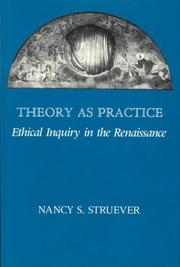
ISBN: 0226777421 Year: 1992 Publisher: Chicago London University of Chicago Press
Abstract | Keywords | Export | Availability | Bookmark
 Loading...
Loading...Choose an application
- Reference Manager
- EndNote
- RefWorks (Direct export to RefWorks)
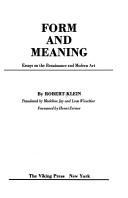
ISBN: 0670323845 Year: 1979 Publisher: New York
Abstract | Keywords | Export | Availability | Bookmark
 Loading...
Loading...Choose an application
- Reference Manager
- EndNote
- RefWorks (Direct export to RefWorks)
Art --- Aesthetics, Modern. --- Art, Renaissance. --- Ethics, Renaissance.
Book
ISBN: 3954879522 9783954879526 Year: 2019 Publisher: Madrid : Iberoamericana Editorial Vervuert,
Abstract | Keywords | Export | Availability | Bookmark
 Loading...
Loading...Choose an application
- Reference Manager
- EndNote
- RefWorks (Direct export to RefWorks)
"La conversación civil" (Brescia, 1574) de Stefano Guazzo (1530-1593) es uno de los diálogos renacentistas sobre la educación moral que tuvo más éxito e influencia en Europa. Este libro ofrece la transcripción de la primera y única traducción al castellano de la obra italiana, realizada por Joseph Gerardo de Hervás a principios del siglo XVIII, que había quedado manuscrita hasta la actualidad.
Philosophy, Italian --- Ethics, Renaissance. --- Guazzo, Stefano,
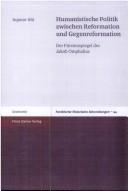
ISBN: 3515079696 Year: 2004 Publisher: Stuttgart Steiner
Abstract | Keywords | Export | Availability | Bookmark
 Loading...
Loading...Choose an application
- Reference Manager
- EndNote
- RefWorks (Direct export to RefWorks)
Ethics, Renaissance --- Kings and rulers --- Conduct of life --- Omphalius, Jakob,
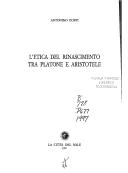
ISBN: 8886521650 Year: 1997 Volume: 29 Publisher: Napoli : La città del sole : Istituto italiano per gli studi filosofici,
Abstract | Keywords | Export | Availability | Bookmark
 Loading...
Loading...Choose an application
- Reference Manager
- EndNote
- RefWorks (Direct export to RefWorks)
Ethics, Renaissance --- Ethics --- Morale de la Renaissance --- Morale --- History --- Histoire --- Plato --- Aristotle --- Influence. --- Influence.
Book
ISBN: 0674242521 0674242513 Year: 2020 Publisher: Cambridge, MA : Harvard University Press,
Abstract | Keywords | Export | Availability | Bookmark
 Loading...
Loading...Choose an application
- Reference Manager
- EndNote
- RefWorks (Direct export to RefWorks)
James Hankins challenges the view that the Renaissance was the seedbed of modern republicanism, with Machiavelli as exemplary thinker. What most concerned Renaissance political theorists, Hankins contends, was not reforming laws but shaping citizens. To secure the social good, they fostered virtue through a new program of education: the humanities.
Social ethics --- Philosophy, Renaissance. --- Ethics, Renaissance. --- Common good. --- Virtue. --- Public interest --- History.
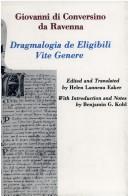
ISBN: 0838718973 Year: 1980 Publisher: Lewisburg Bucknell university press
Abstract | Keywords | Export | Availability | Bookmark
 Loading...
Loading...Choose an application
- Reference Manager
- EndNote
- RefWorks (Direct export to RefWorks)
Ethics, Renaissance --- Political science --- Early works to 1800 --- Giovanni, --- Italy --- Politics and government
Book
ISBN: 9782503525242 2503525245 Year: 2013 Volume: 3 Publisher: Turnhout Brepols
Abstract | Keywords | Export | Availability | Bookmark
 Loading...
Loading...Choose an application
- Reference Manager
- EndNote
- RefWorks (Direct export to RefWorks)
Moral philosophy, and particularly ethics, was among the most contested disciplines in the Renaissance, as philosophers, theologians, and literary scholars all laid claim to it, while an expanding canon of sources made the ground shift under their feet. In this volume, eleven specialists drawn from literature, intellectual history, philosophy, and religious studies examine the configuration of ethics and how it changed in the period from Petrarch to Descartes. They show that the contexts in which ethics was explored, the approaches taken to it, and the conclusions it reached make Renaissance ethics something worthy of exploration in its own right, in distinction to both medieval and early modern ethics. Particular attention is given to the development of new audiences, settings, genres, and mediums in ethical discussions, as well as the continuities with the formal exploration of ethics through commentaries. Renaissance ethics emerges as a highly eclectic product, which combined Christian insights with the Aristotelian and Platonic traditions while increasingly incorporating elements from Stoicism and Epicureanism. This volume will be of particular interest to students and researchers who wish to gain an overall view of how ethics developed throughout Europe in response to the cultural, historical, and religious changes between 1350 and 1650. --from back cover.
General ethics --- anno 1600-1699 --- anno 1400-1499 --- anno 1500-1599 --- anno 1300-1399 --- Ethics [Renaissance ] --- Ethiek [Renaissance ] --- Morale de la renaissance --- Renaissance ethics --- Morale de la Renaissance --- Ethics --- Renaissance --- History --- Morale de la Renaissance. --- Ethics, Renaissance --- Ethics, Renaissance. --- Etik --- Historia. --- Renässansen.
Book
ISBN: 2914219016 Year: 2000 Publisher: Paris : Noxia,
Abstract | Keywords | Export | Availability | Bookmark
 Loading...
Loading...Choose an application
- Reference Manager
- EndNote
- RefWorks (Direct export to RefWorks)
Constancy --- Ethics, Renaissance --- Conduct of life --- Constance --- Morale de la Renaissance --- Morale pratique --- Early works to 1800 --- Early works to 1800 --- Ouvrages avant 1800 --- Ouvrages avant 1800
| Listing 1 - 10 of 26 | << page >> |
Sort by
|

 Search
Search Feedback
Feedback About UniCat
About UniCat  Help
Help News
News